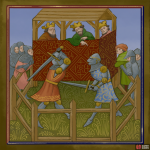Text
The meaning of the word honour in the Middle Ages encompassed not only honesty but particularly living in accordance with the conventions of one’s status. An honourable craftsman was one who followed the guild’s rules, attended church, and had no disreputable remarks made about him. Honour was sacred, and preserving it was a matter of prestige and social status.
Losing one’s honour meant ending up on the fringes of society. Thus, honour had to be not only built but also fiercely defended. Honour could be lost not only by transgressing social norms (such as having an illegitimate child or losing virginity before marriage) but also by violating unwritten conventions (such as shaking hands with an executioner, handling a dead body or carcass) or simply by failing to defend one’s honour when it was challenged.
In medieval perception, there were also so-called dishonourable people, those who had no honour at all. This group included executioners, knackers, prostitutes, and beggars. At certain times in history, millers were also considered dishonourable. Calling someone a sexual organ or an animal was not nearly as insulting as calling them dishonourable. Such insults often ended up before the bailiff, the court, or even in a duel.
A special chapter is devoted to knightly honour, which was often a theme in literary works and, from today’s perspective, can seem almost comical.


No Comments